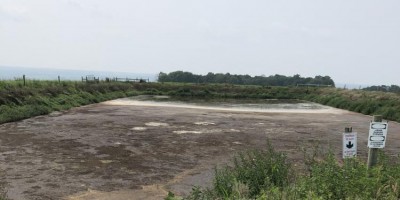PRO-DAIRY seeks farm partners for greenhouse gas project

Project will study greenhouse gas emissions from manure storage
PRO-DAIRY Dairy Environmental Systems (DES) is seeking farm partners for a study of greenhouse gas (GHG) emissions from manure storage sites.
Methane is an important GHG emitted from manure storages. New York State (NYS) has begun an intensive effort to reduce methane emissions in support of the Climate Leadership and Community Protection Act (CLCPA). Despite its significance in air quality and climate change, the sources and quantities of methane from dairy farms are uncertain. DES has a project to help define the existing impacts of methane from manure storage and the potential treatments to reduce it. The project aims to improve GHG emission estimates and provide observational evidence to support best practices to reduce emissions from dairy farms in NYS.
DES will measure air methane concentration using a backpackable gas analyzer around and near the perimeter of in-ground, long-term storages of dairy manure about once monthly for at least two years and up to 30 months. A drone for vertical and aerial methane measurements and a ground-based meteorological station will be used to construct methane emission flux estimates. Initial visits will include sampling for nitrous oxide (another GHG) using a similar gas concentration analyzer.
The temperature within each long-term manure storage will also be measured. Influent and effluent from each storage will be sampled to determine volatile solids content and nutrient content (ammonia, Total Kjeldahl Nitrogen, total phosphorus, potassium) to try to refine a predictive equation.
DES will include each of the following dairy manure storage types that have a known input, a scheduled emptying, and are not excessively influenced by surrounding barns. Satellite/remote storages may be possible.
- Raw manure
- Raw manure separated liquid
- Digested manure, unseparated
- Digested manure, separated liquid
- Digested manure + food waste, unseparated
- Digested manure + food waste, separated liquid
Results will inform how to help dairy farms establish a baseline and then move towards sustainability. Please contact us with potential sites to be considered for inclusion in the study.
Lauren Ray (ler25)
Peter Wright (pew2)
Angela George (ag2292)
If you would like to participate, please contact Camila Lage at cd546@cornell.edu or 607-422-6788 for more information.
Upcoming Events
Cornell Organic Field Crops & Dairy Conference
March 6, 2026
Waterloo, NY
Farmers, researchers, educators, and agricultural service providers from across the Northeast are invited to the 2026 Cornell Organic Field Crops & Dairy Conference, held Friday, March 6, 2026, from 8:00 a.m. to 4:30 p.m. at the Lux Hotel & Conference Center in Waterloo, N.Y.
Co-hosted by New York Soil Health and Cornell CALS, the annual conference brings together leaders in organic grain, dairy, and livestock systems to share practical tools, new research, and farmer-tested strategies to support resilient and profitable organic production.
NY Pork Producers - 2026 Producer Summit & Annual Meeting
March 13 - March 14, 2026
Hamilton, NY
Join NYPP for the 2026 Producer Summit, where producers of all sizes and production styles will explore marketing, branding, selling pork, and current consumer trends through practical sessions designed to help build demand, connect with customers, and add value to their operations.
Mid Atlantic Grain Conference
March 15 - March 16, 2026
We're excited to share that the 2026 Mid‐Atlantic Grain Fair & Grain Conference is coming March 15-16, 2026 in Pennsylvania! This two-day event brings together farmers, millers, bakers, brewers, distillers, researchers, and grain enthusiasts to learn, connect, and celebrate local grains. These events will be offered at two seperate locations.
Announcements
No announcements at this time.





